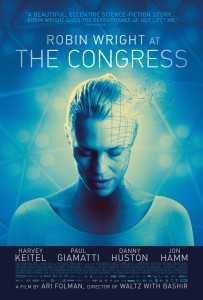The Congress has been made by Ari Folman, and I would go as far as to say the filmmaker is a visionary. When watching The Congress, it’s clear the filmmaker has a wide load on his mind, and he expresses those thoughts in various artistic ways. Folman’s imagination may have been the leverage that earned his Waltz With Bashir an Oscar nomination in 2009.
The downside with being a visionary, however, is figuring out how not to get ahead of yourself. Creative integrity could likely become less of a high-end quality as it embodies more of an artistic sanctum. Folman may have the ability to propose grandiose ideas with noble imagery, but he’s unable to include his audience in on the breakthroughs. It’s a shame since a lot of this balderdash probably bares ideologic honesty about the work this film is based on (Stanislaw Lem’s short novel The Futurological Congress).
The Congress has trouble from the get-go. The premise has actress Robin Wright playing a heightened version of herself in an overly heightened reality of greedy Hollywood. She’s referred to as a falling star, someone who is flakey and unreliable, as well as untalented at her current age. Wright takes these blunt negativities without flinching, but a couple of these jabs has Folman’s screenplay sounding harsh and too personal. I wonder if real life Wright found this experience to be cathartic or defeating. Maybe she’s a masochist.
Anyways, she’s offered one last gig. The job: to hand over her identity to a computer, where her likeliness will be altered to suit various films. A technological copy of herself will do all the acting, while she lives a remaining undisclosed life. Feeling stripped and desperate, she agrees to the procedure.
Folman is trying to satirize how prop-like actors can be, and how impersonal business executives have the tendency of being. But, he’s also treating the scenario as goofy science fiction. It’s possible for Folman to have his film both ways, but he doesn’t ground himself in either the fantasy realm or a convincing modern day. He has these curt expressions about movie mechanics and how Wright is a pitiful mess, yet has our “down-and-out” actress living lavishly in a re-done airplane hanger and living in a world where adults don’t talk like adults and kids don’t talk like kids.
The contract she signs last twenty years. We’re transported to the expiration where the future has succumbed to contrived conveniences that only exist to add cinematic style. For instance, the gutless studio can now only be accessed through animation. You gulp some liquid, and instantly become the offspring of Robert Crumb and Ralph Bakshi.
The Hollywood roasting slides to the back burner, and Folman now focuses on progressing technology, the detachment between old and new, and extremist threats that don’t oblige to the latest immoral normality.
The Congress is the type of movie where you have the sudden urge to feel the walls around you in order to convince yourself you haven’t been knocked unconscious. The political switch is so abrupt that movie goers are convinced we’re watching a throwaway flick Robin Wright’s computer self stars in. The incoherencies hamper our viewing, giving Folman a head start on his second and third acts. We always feel like we’re playing catch up with someone who is constantly bending the rules to abide to his own expectations to adapt an impossible novel.
The audience can never catch a break. Audiences are pushed further away as Wright voices her animated personality with sadness alongside an animated hero (voiced by Jon Hamm) who has severe melancholy towards Wright. The Congress is sullen and miserable as Folman surrounds his film with a fascinating palette of unique designs.
Folman lacks the experience to make notes and accusations about how unmannerly corrupt mainstream studios, and he’s missing self-discipline in his kooky storytelling. The Congress may make sense, but it would take infinite viewings to garner any contextual significance. If it gains a cult following in years to come, that’s great for Folman – he got lucky. But currently, this film is disjointed and maddeningly inaccessible.
I sincerely hope Ari Folman’s filmmaking career will flourish as he gradually learns to make better, less delirious movies than The Congress.

Leave a comment